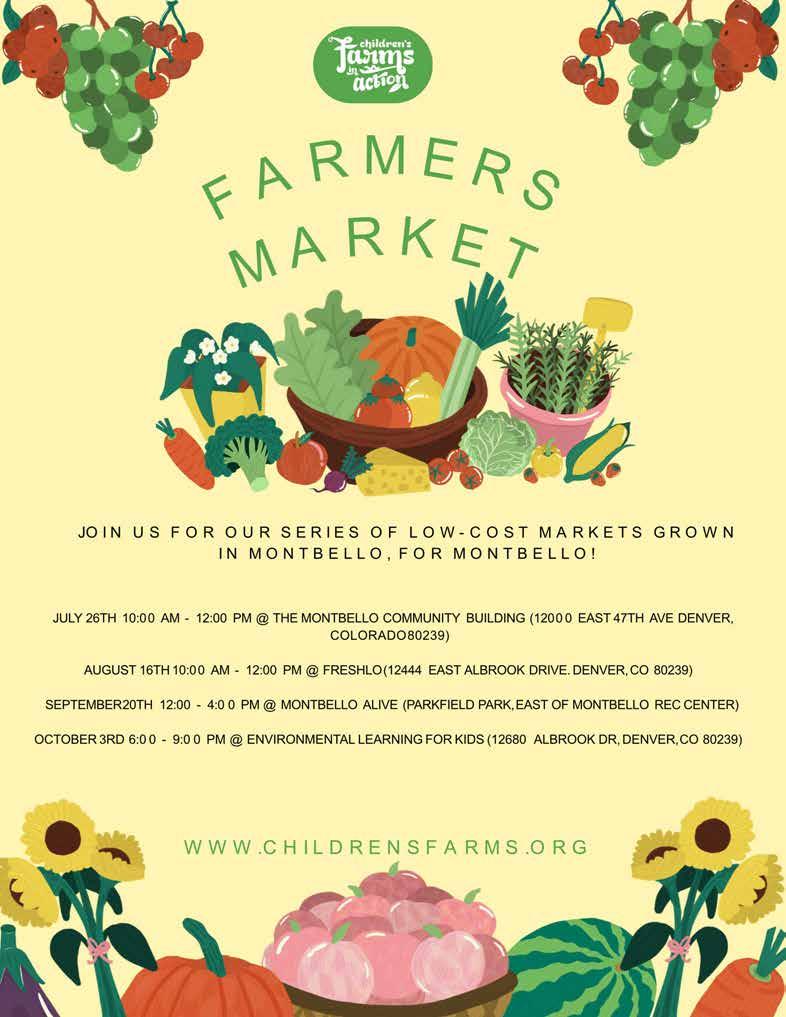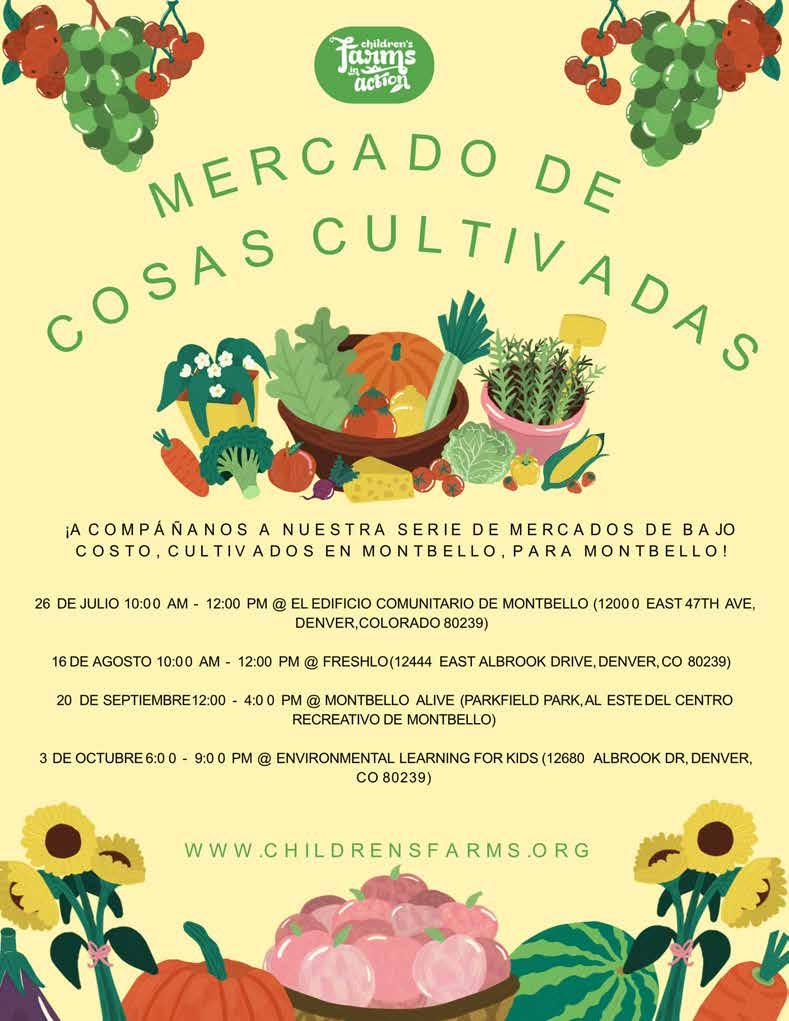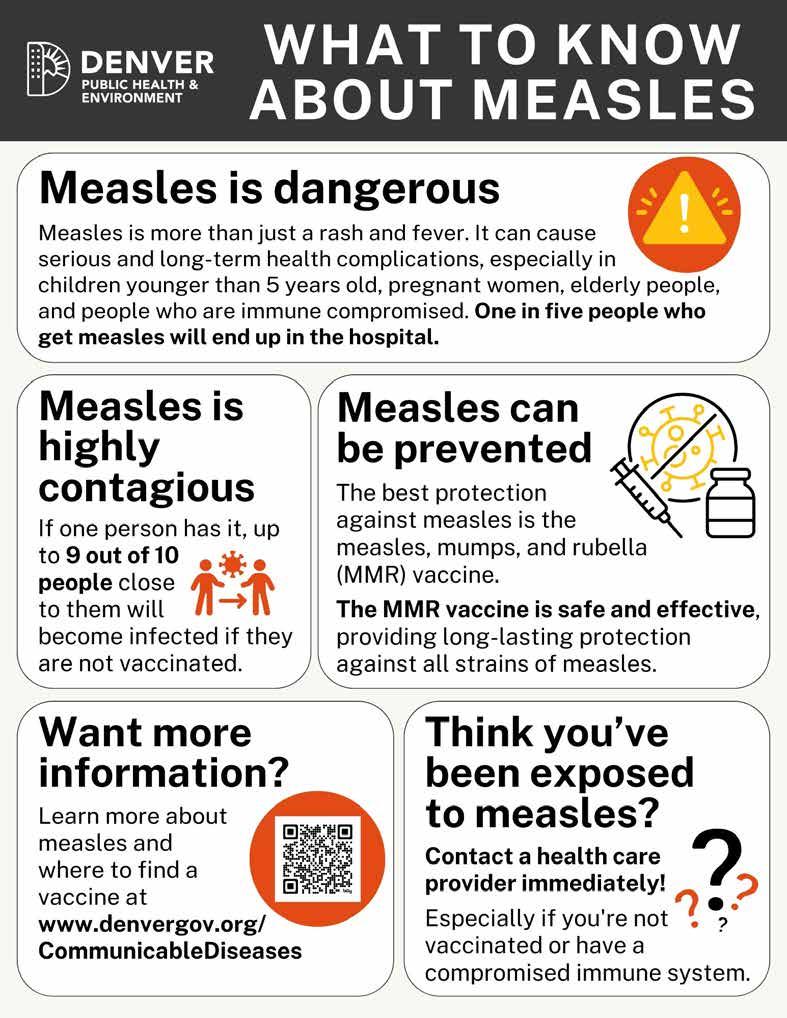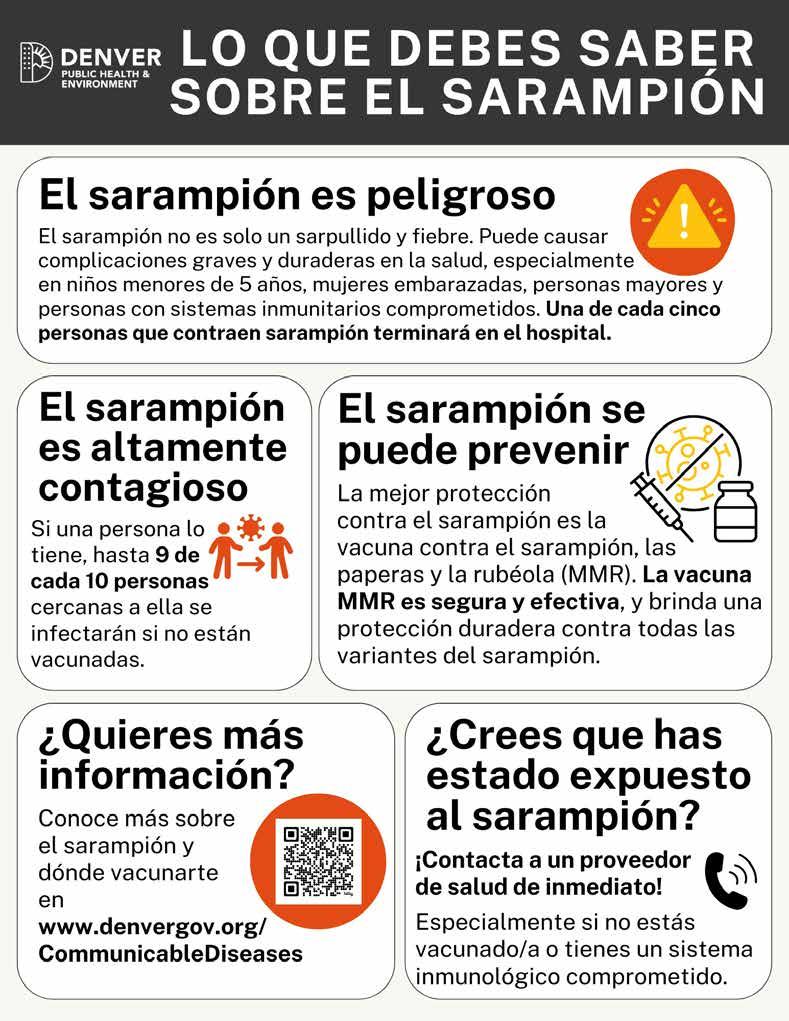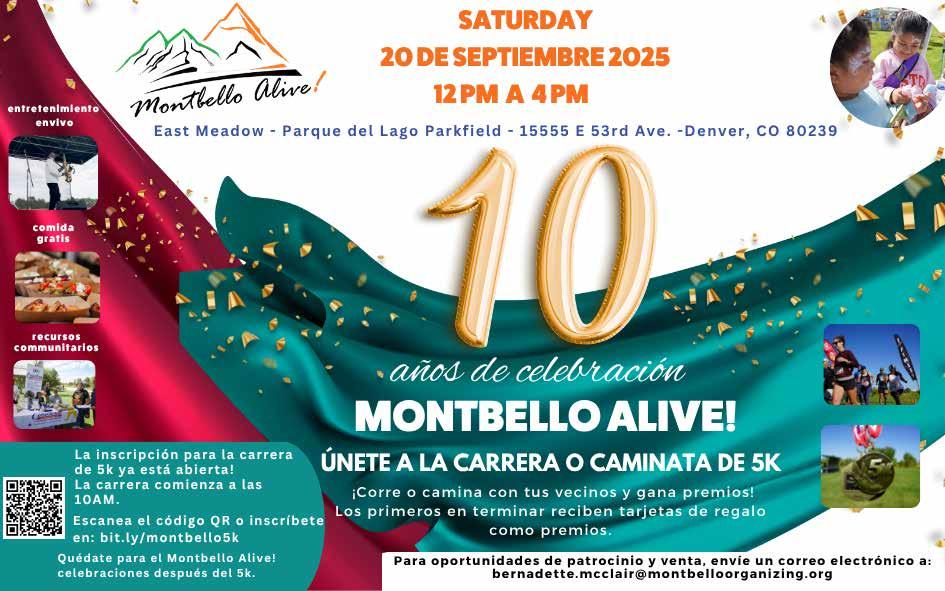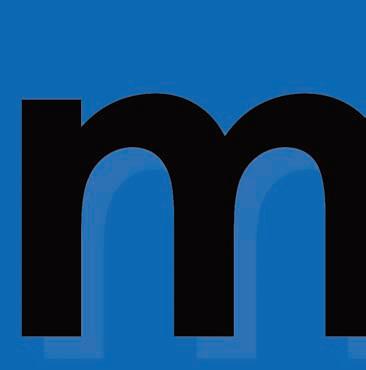
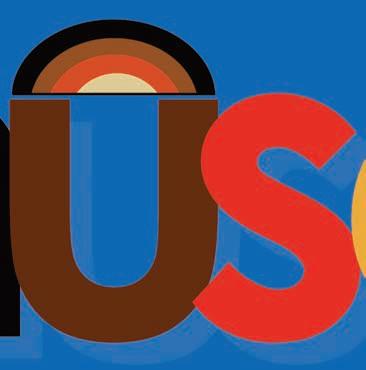






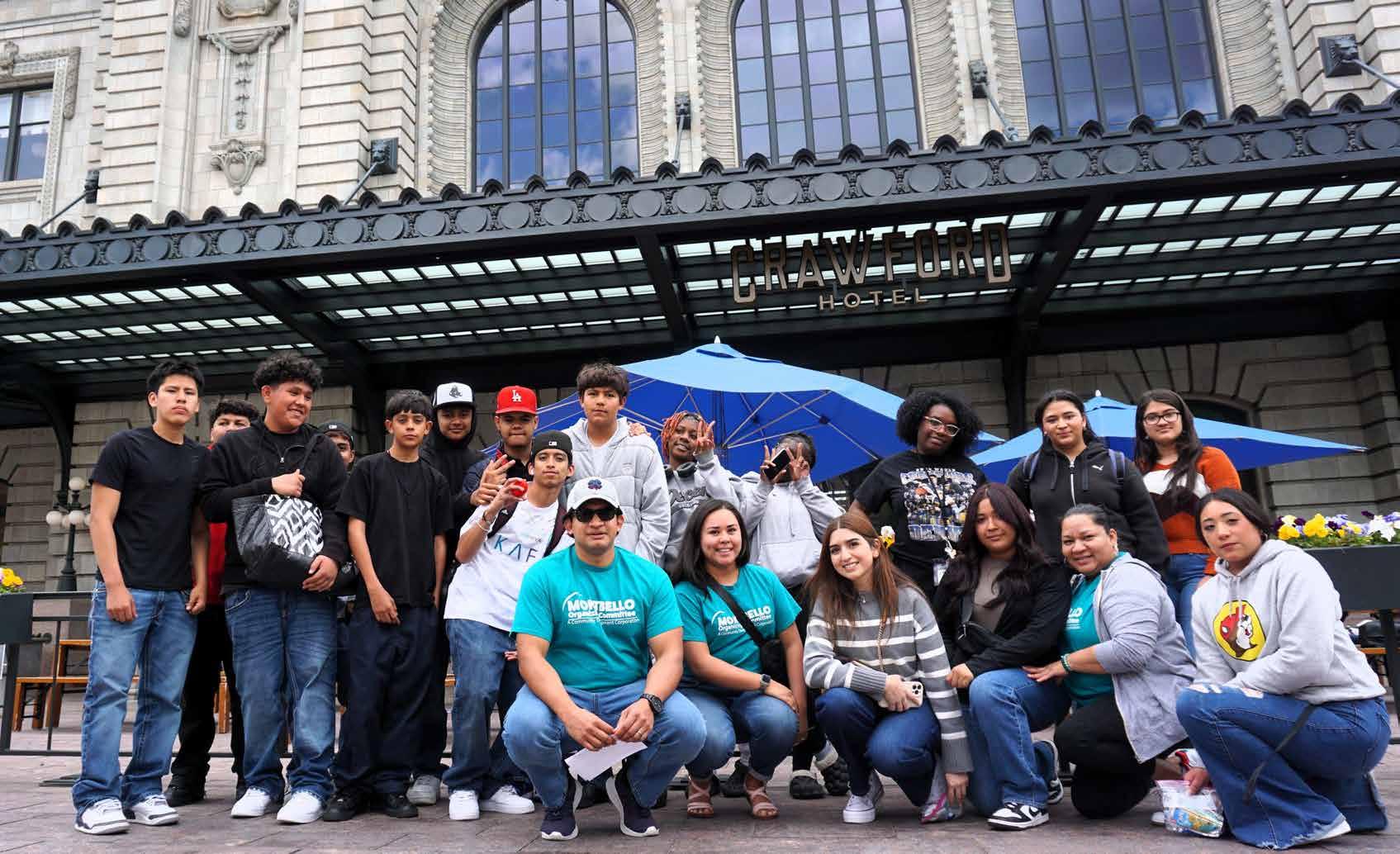











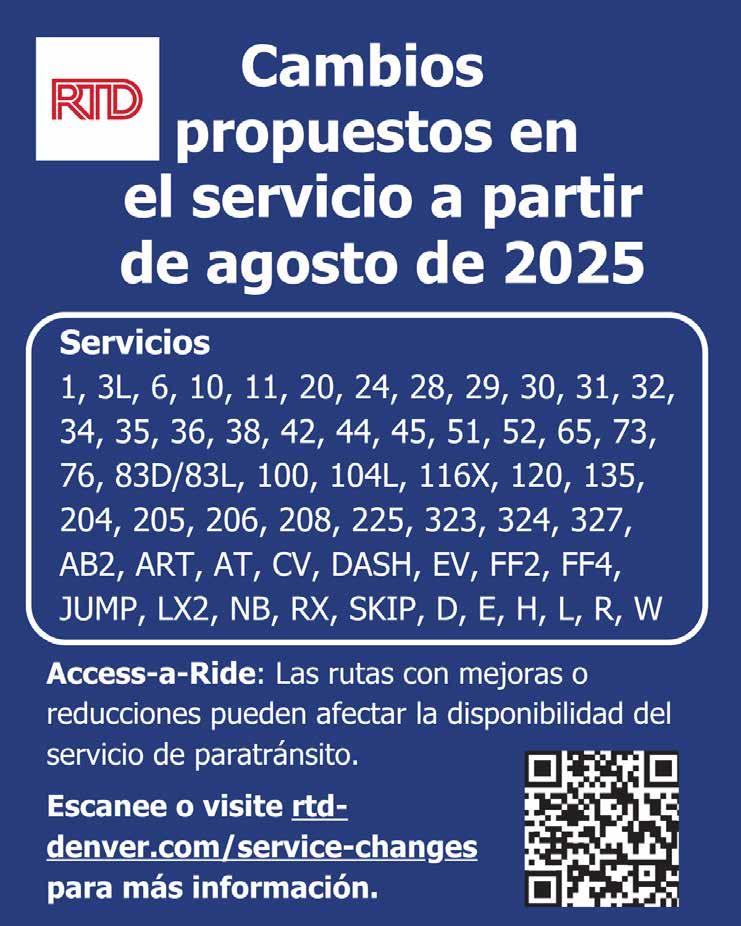




















525,600 minutes
525,000 moments so dear 525,600 minutes
How do you measure, measure a year?
In daylights, in sunsets, in midnights, in cups of coffee
In inches, in miles, in laughter, in strife In 525,600 minutes
How do you measure a year in the life? (Seasons of Love from the Broadway Musical, “Rent”)
"Seasons of Love" from the musical "Rent" is a poignant and emotionally charged song that delves into the profound theme of measuring a year in one's life, particularly in the unifying context of friendships and love.
I think of this song often and the significance of a year in a person’s life. I think of it in relationship to my own life and in terms of what the FreshLo HUB means to the people who have come home there this past year.
There was a year in my life (in fact it was three years) where every horrific thing that could happen happened. Through virtually no fault of my own, I lost my job, my home, my car, my health, lost one family member and almost lost a second one. After exhausting all my savings and being traumatized by losing almost everything, I truly came to better understand what it means to walk in someone else’s shoes. Everything around me felt hopeless.
Those experiences helped prepare me for understanding the inordinate number of challenges that many residents in the FreshLo HUB have experienced and, for some, continue to experience. But for the Grace of God and family and friends, I might not have made it through that terrible time. The turning point came in the slow recovery to health and hope at the moment where I could move from instability to my now home. That very action has proven a turning point for many of the residents who now call FreshLo HUB home.
Since last August 2024 (almost a year) when people began moving into their apartments at 12444 Albrook Drive 80239, I have heard story after story of trauma and uncertainty that has been mitigated by the sheer fact of moving into a home that is safe, clean, and comfortable. I have heard stories of single moms who, with their children, were living in hotels; grandmothers who were sharing a home with 12-15 other family members; people literally living in their cars despite the fact that they had one, two, even three jobs. What comes across most poignantly is the sense of hope that people have begun to experience in their lives. Those are the impacts that cannot be captured by the mere listing of numbers.
Maybe that is the most powerful message of this issue of the MUSE – in Unity comes Hope! Together we can create HOPE.
Respectfully yours, Donna Garnett

Editor, Montbello Urban Spectrum Edition CEO, Montbello Organizing Committee
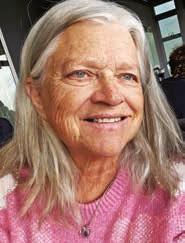

MONTBELLO URBAN SPECTRUM EDITION
PUBLISHER
Montbello Organizing Committee/Denver Urban Spectrum
EDITOR AND LEAD WRITER - Donna Garnett
Contributing Writers:
Mary Ann Bash, Senate President James R. Coleman, Sofi De La Mora, FaithBridge SHIFT Fellowship (Lily B. and Sophia S.), Councilmember Stacie Gilmore, LaKeshia Hodge, Councilwomen Shontel M. Lewis, Leo Lopez, Noah Stout, Chris Urias
Photo credits:
Denver Public Library, FaithBridge, Parents for Parity, Struggle of Love Foundation
TRANSLATOR - Marta Welch
ART DIRECTOR - Bee Harris
AD SALES - Bernadette McClair



The Montbello Urban Spectrum Edition (MUSE) is a bi-monthly publication produced and published by the Denver Urban Spectrum (DUS) and the Montbello Organizing Committee (MOC). MUSE is circulated throughout Denver’s Far Northeast community.
Contents of MUSE are copyright 2025 by Denver Urban Spectrum and the Montbello Organizing Committee. No portion may be reproduced without written permission of the publishers.
MUSE welcomes all letters, but reserves the right to edit for space, libelous material, grammar, and length. All letters must include name, address, and phone number. We will withhold author’s name on request. Unsolicited articles are accepted without guarantee of publication or payment and may be submitted to the editor at info@montbelloorganizing.org.
For advertising information, email info@montbelloorganizing.org.




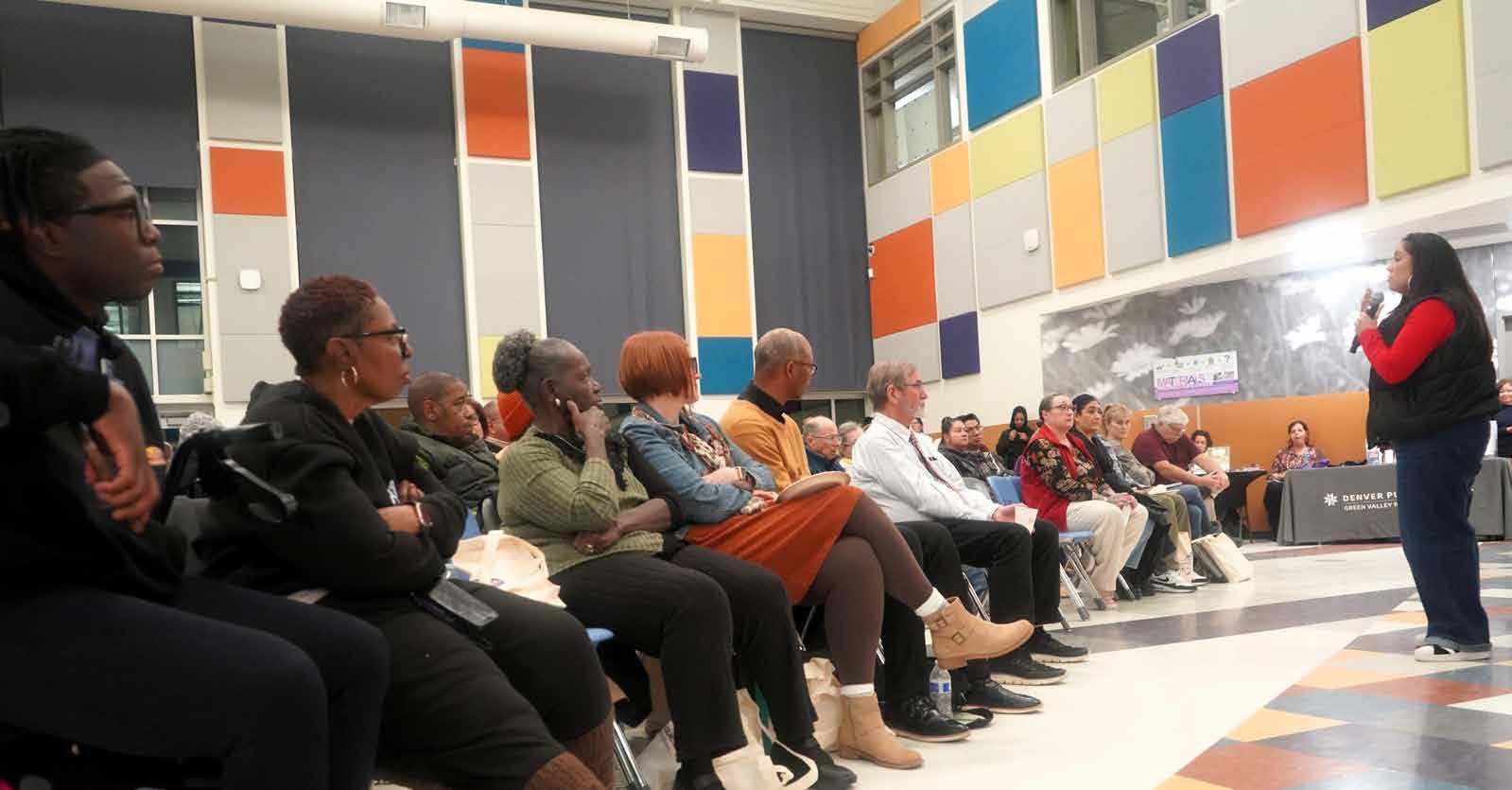
In a time when division too often makes headlines, Montbello stands as a powerful reminder that unity isn’t just possible, it’s necessary. The strength of our community has never come from silence or separation; it comes from neighbors linking arms, speaking truth, and refusing to let injustice pass unchecked. It comes from people who believe that standing up for someone else is not an act of charity, it’s a commitment to shared humanity.
Being an ally is not a title, it’s a practice. It requires listening deeply, showing up consistently, and speaking out, especially when it’s uncomfortable. For those of us who hold privilege: whether by race, citizenship, income, education, or access: allyship means using that privilege in service of justice, not comfort.
Montbello has always been rich with this kind of courageous advocacy. From the families who showed up to protect our schools from closures, to

those who fought tirelessly to bring affordable housing to our neighborhood while fighting displacement, to youth who speak truth to power at city council meetings, our community has shown what it means to stand together.
But the work is not done.
Discrimination, whether based on race, immigration status, gender identity, disability, or other identities, still harms too many in our community. And that harm is not abstract. It’s the father afraid to report wage theft because of his immigration status. It’s the student who stops dreaming because he’s told he doesn’t belong in honors classes. These are not isolated issues; they are connected by a system that too often excludes, marginalizes, and devalues people of color and working families.
That’s why unity isn’t just powerful, it’s essential.
At the Montbello Organizing Committee, we’ve seen what happens when allies and advocates come together across
differences. We’ve seen residents organize side by side for safer communities, affordable housing, and economic equity. We’ve seen students lead restorative justice circles and elders demand equitable development with the same moral fire. That advocacy isn’t limited to boardrooms or ballot boxes, it lives in block parties, food pantries, and the quiet courage of people who show up for each other.
As an attorney, I’ve seen that the law is too often used to intimidate and exclude. But I’ve also seen how collective organizing can change policy, transform institutions, and build power. When communities speak with one voice, it’s impossible to ignore that voice.
If you’re wondering what allyship can look like in everyday life, here are a few ways to start:
1. Listen
2. Show Up: Attend meetings, town halls, or community events even when the issue doesn’t affect you directly.
3. Use Your Voice: If you witness oppression, say something. Silence is not neutral.
4. Share Resources: Whether it’s time, food, or money; find ways to support grassroots efforts in the community.
5. Keep Learning: Keep educating yourself about histories of oppression and resistance in our community and beyond.
Our work towards a collective goal and a more unified community isn’t easy. It takes work. It takes trust. It means disagreeing sometimes but still choosing to build together. But Montbello has never shied away from hard work. Montbello is a neighborhood of advocates, dreamers, and fighters. There is power in a community that sees its diversity not as a problem to solve, but as a strength to defend.
There is power in a community that says: “Your fight is my fight. Your liberation is tied to mine.” Y

En una época en la que la división con demasiada frecuencia acapara los titulares, Montbello se mantiene como un poderoso recordatorio de que la unidad no solo es posible, sino necesaria. La fuerza de nuestra comunidad nunca ha provenido del silencio o la separación; proviene de vecinos que se unen, que hablan con la verdad y que se niegan a permitir que la injusticia pase desapercibida. Proviene de personas que creen que defender a alguien más no es un acto de caridad, sino un compromiso con la humanidad compartida.
Ser aliado no es un título, es una práctica. Requiere escuchar profundamente, presentarse de forma constante y alzar la voz, especialmente cuando resulta incómodo. Para quienes tenemos privilegio — ya sea por raza, ciudadanía, ingresos, educación o acceso— ser aliado significa usar ese privilegio al servicio de la justicia, no de la comodidad. Montbello siempre ha estado lleno de este tipo de defensa valiente. Desde las familias que se presentaron para proteger nuestras escuelas
del cierre, hasta quienes lucharon incansablemente por traer vivienda asequible a nuestro vecindario mientras combatían el desplazamiento, pasando por jóvenes que hablan con valentía ante el poder en las reuniones del concejo municipal, nuestra comunidad ha demostrado lo que significa mantenerse unida.
Pero el trabajo no ha terminado.
La discriminación, ya sea por raza, estatus migratorio, identidad de género, discapacidad u otras identidades, sigue dañando a demasiadas personas en nuestra comunidad. Y ese daño no es abstracto. Es el padre que tiene miedo de denunciar el robo de salario debido a su estatus migratorio. Es el estudiante que deja de soñar porque le dicen que no pertenece en clases avanzadas. Estos no son problemas aislados; están conectados por un sistema que con demasiada frecuencia excluye, margina y desvaloriza a las personas de color y a las familias trabajadoras.
Por eso la unidad no solo es poderosa, es esencial.
En el Comité de Organiza-
ción de Montbello, hemos visto lo que sucede cuando aliados y defensores se unen a pesar de sus diferencias. Hemos visto a residentes organizarse codo a codo por comunidades más seguras, vivienda asequible y equidad económica. Hemos visto a estudiantes liderar círculos de justicia restaurativa y a personas mayores exigir un desarrollo equitativo con la misma fuerza moral. Esa defensa no se limita a salas de juntas ni a las urnas; vive en las fiestas del vecindario, en los bancos de alimentos y en el valor silencioso de las personas que se apoyan mutuamente. Como abogado, he visto que la ley con demasiada frecuencia se usa para intimidar y excluir. Pero también he visto cómo la organización colectiva puede cambiar políticas, transformar instituciones y construir poder. Cuando las comunidades hablan con una sola voz, es imposible ignorarla.
Si te preguntas cómo puede verse la alianza en la vida cotidiana, aquí hay algunas maneras de comenzar:
1. Escucha
2. Preséntate: Asiste a reuniones, asambleas comunitar-
ias o eventos, incluso si el tema no te afecta directamente.
3. Usa Tu Voz: Si presencias una opresión, di algo. El silencio no es neutral.
4. Comparte Recursos: Ya sea tiempo, comida o dinero, encuentra maneras de apoyar los esfuerzos comunitarios desde la base.
5. Sigue Aprendiendo: Sigue educándote sobre las historias de opresión y resistencia en nuestra comunidad y más allá.
Nuestro trabajo hacia un objetivo colectivo y una comunidad más unificada no es fácil. Requiere esfuerzo. Requiere confianza. Significa estar en desacuerdo a veces, pero aun así elegir construir juntos. Pero Montbello nunca ha rehuido el trabajo duro. Montbello es un vecindario de defensores, soñadores y luchadores. Hay poder en una comunidad que ve su diversidad no como un problema que resolver, sino como una fortaleza que defender. Hay poder en una comunidad que dice: “Tu lucha es mi lucha. Tu liberación está ligada a la mía.” Y
Senate President James R. Coleman

As your Senate President, I’ve witnessed firsthand how communities coming together can create powerful change. This summer, I’m proud to share several legislative achievements that demonstrate the truth behind power in unity. When we unite around shared values and work collaboratively across different perspectives, we create meaningful progress for all Coloradans. This session has proven that principle with several important bills advancing through our legislature.
I’m particularly proud of House Bill 25-1041, the Student Athlete Name Image or Likeness bill, which was signed into law by the governor on March 28. This legislation empowers student athletes to benefit from their own talents and hard work while pursuing their education. By working alongside Representative Smith and Senator Amabile, we’ve ensured that young athletes have the right to control their personal brand and image while receiving fair compensation, a matter of fun-
damental fairness and respect. Our commitment to unity also extends to those in our correctional system. House Bill 25-1013, regarding Department of Corrections Visitation Rights, acknowledges the crucial role that family connections play in rehabilitation and reducing recidivism. By ensuring reasonable visitation rights, we strengthen family ties and improve outcomes for everyone involved. This bill, cosponsored with Representatives English and Bacon and Senator Exum, represents our belief that treating people with humanity benefits our entire society.
I’m proud to announce the passing of House Bill 25-1272 addressing Construction Defects and Middle Market Housing. As housing remains a critical challenge for many Coloradans, this bill demonstrates what we can accomplish when developers, consumer advocates, and legislators come together around shared solutions rather than remaining divided. In healthcare, I’ve worked in a bipartisan partnership with Senator Simpson and Representatives Bacon and English to sponsor Senate Bill 25-122, which would extend the Emily Keyes – John W. Buckner Organ and Tissue Donation Awareness Fund indefinitely. This lifesaving program exemplifies how unity of purpose transcends traditional political divisions.
While we may have different perspectives on some issues, I believe we’re strongest when we recognize our common humanity and work together toward solutions that benefit all Coloradans. That’s the power in unity I’m committed to fostering as your Senate President.
Presidente del Senado James R. Coleman
Como su Presidente del Senado, he sido testigo directo de cómo las comunidades, al unirse, pueden generar cambios poderosos. Este verano, me enorgullece compartir varios logros legislativos que demuestran la verdad detrás del poder en la unidad. Cuando nos unimos en torno a valores compartidos y trabajamos de manera colaborativa desde diferentes perspectivas, logramos un progreso significativo para todos los habitantes de Colorado. Esta sesión ha demostrado ese principio con varias leyes importantes que avanzan en nuestra legislatura.
Estoy particularmente orgulloso del Proyecto de Ley de la Cámara 25-1041, la ley sobre el Nombre, Imagen o Semejanza de los Atletas Estudiantiles, que fue promulgada por el gobernador el 28 de marzo. Esta legislación empodera a los atletas estudiantiles para que se beneficien de sus propios talentos y esfuerzo mientras persiguen su educación. Al trabajar junto con el Representante Smith y la Senadora Amabile, nos aseguramos de que los jóvenes atletas tengan el derecho a controlar su marca e imagen personal, y reciban una compensación justa—un tema de justicia y respeto fundamentales.
Nuestro compromiso con la unidad también se extiende a quienes están en nuestro sistema correccional. El Proyecto de Ley de la Cámara 25-1013, sobre los Derechos de Visita
del Departamento de Correcciones, reconoce el papel crucial que desempeñan las conexiones familiares en la rehabilitación y la reducción de la reincidencia. Al garantizar derechos de visita razonables, fortalecemos los lazos familiares y mejoramos los resultados para todos los involucrados. Este proyecto de ley, copatrocinado con los Representantes English y Bacon y el Senador Exum, representa nuestra creencia de que tratar a las personas con humanidad beneficia a toda nuestra sociedad.
Estoy orgullosa de anunciar que se aprobó el Proyecto de Ley de la Cámara 25-1272, que aborda los Defectos de Construcción y la Vivienda de Mercado Medio. Dado que la vivienda sigue siendo un desafío crítico para muchos habitantes de Colorado, este proyecto de ley demuestra lo que podemos lograr cuando los desarrolladores, defensores de los consumidores y legisladores se unen en torno a soluciones compartidas en lugar de permanecer divididos. En el ámbito de la salud, he trabajado en una asociación bipartidista con el Senador Simpson y los Representantes Bacon y English para patrocinar el Proyecto de Ley del Senado 25-122, que extendería indefinidamente el Fondo de Concientización sobre la Donación de Órganos y Tejidos Emily Keyes – John W. Buckner. Este programa que salva vidas ejemplifica cómo la unidad de propósito trasciende las divisiones políticas tradicionales. Si bien podemos tener diferentes perspectivas sobre algunos temas, creo que somos más fuertes cuando reconocemos nuestra humanidad común y trabajamos juntos hacia solu-
ciones que beneficien a todos los habitantes de Colorado. Ese es el poder en la unidad que me comprometo a fomentar como su Presidente del Senado. Y
Councilmember Stacie Gilmore
prove our community through capital investments. You completed the online survey, attended the meeting, and we will continue to engage with you about where the process is and how you can lift your ideas through public comments and other ways.

When times are difficult, it is vital that we cultivate unity within our community. It is a time to come together, and to share space, food and company. People are feeling scared, anxious and stressed. We do not do well in isolation. We need each other’s company – greeting each other, hearing how folks are doing, and actively listening. The number of people who share with me after a community meeting that “this felt so good,” that they are inspired and feel informed about what is happening in their neighborhoods, is a testament to the power of unity. As a community, we are united against racism and oppression. It’s important to name what we are working for and against. With the federal government terrorizing our most vulnerable, it is foundational for us to come together to support each other.
We have been encouraging power in unity recently through public education about peoples’ constitutional rights of due process and freedom of speech. Listening to community is also a priority and we recently held a Vibrant Denver Bond meeting to hear your ideas about how to im-
Be sure and look for more events and gatherings in our parks. Getting outdoors and into nature helps us all to decompress, build resiliency and heal. Community stewardship projects are plentiful and a true sign of your love and passion for our beautiful neighborhoods. Planting flowers and trees or cleaning up a park allows us to cultivate that seed of unity that blooms when we come together for good. I look forward to seeing you in community. As always, you can reach out to meet with me directly as well.
Concejala Stacie GilmoreMiembra del Consejo
Cuando los tiempos son difíciles, es vital que cultivemos la unidad dentro de nuestra comunidad. Es un momento para unirnos, compartir espacio, comida y compañía. La gente se siente asustada, ansiosa y estresada. No nos va bien en el aislamiento. Necesitamos la compañía de los demás: saludarnos, saber cómo están las personas y escuchar activamente. La cantidad de personas que me dicen, después de una reunión comunitaria, que “esto se sintió muy bien”, que se sienten inspiradas e informadas sobre lo que está ocurriendo en sus vecindarios, es un testimo-
nio del poder de la unidad. Como comunidad, estamos unidos contra el racismo y la opresión. Es importante nombrar aquello por lo que estamos luchando y aquello contra lo que luchamos. Con el gobierno federal aterrorizando a nuestras personas más vulnerables, es fundamental que nos unamos para apoyarnos mutuamente.
Recientemente, hemos estado fomentando el poder de la unidad a través de la educación pública sobre los derechos constitucionales de las personas, como el debido proceso y la libertad de expresión. Escuchar a la comunidad también es una prioridad y recientemente llevamos a cabo una reunión del Bono de Denver Vibrante (Vibrant Denver Bond) para escuchar sus ideas sobre cómo mejorar nuestra comunidad mediante inversiones de capital. Ustedes completaron la encuesta en línea, asistieron a la reunión, y seguiremos colaborando con ustedes sobre el estado del proceso y cómo pueden hacer valer sus ideas mediante comentarios públicos y otras formas.
Asegúrense de estar atentos a más eventos y reuniones en nuestros parques. Salir al aire libre y conectar con la naturaleza nos ayuda a todos a descomprimir, desarrollar resiliencia y sanar. Los proyectos comunitarios de conservación son abundantes y un verdadero reflejo de su amor y pasión por nuestros hermosos vecindarios. Plantar flores y árboles o limpiar un parque nos permite cultivar esa semilla de unidad que florece cuando nos unimos por una buena causa. Espero verlos en comunidad. Como siempre, pueden comunicarse directamente conmigo si desean reunirse. Y
Councilwoman
Shontel M. Lewis
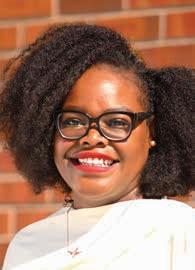
In the face of national uncertainty and division, our community continues to show what real strength looks like. While others try to divide us or strip away our rights, we meet these challenges with unity, compassion, and a relentless drive to build something better—for ourselves and future generations.
Our district is defined by how we love and support one another. In the face of systemic injustice, we create care networks. When institutions fail us, we build our own tables. As your councilwoman, I see the brilliance of our people every day—in community organizations, youth programming, cultural gatherings, and everyday acts of compassion.
Real change doesn’t come from outside forces. It begins with us. Whether you join a clean-up, attend a neighborhood gathering, or bring a friend to a town hall, you are not just participating—you are helping lead the fight for justice, accountability, and joy.
If you aren’t sure where to begin, my office maintains a public calendar of local events. You’ll find the link at the bottom of this article. If you have an event to add, email us at district8@denvergov.org—we want to help amplify your work.
We also have a once-in-ageneration opportunity to turn our collective power into something beautiful and lastContinued on page 8
Continued from page 7 ing. The city is acquiring a 155acre parcel of land that will become a public park—right here in Northeast Park Hill. But this must be our park, shaped by your vision. That means green space that reflects our values, programming that serves our families, and a place where we can gather in joy, love, and optimism for the future.
Let’s ensure your voice guides this process from the beginning. My office is working with the mayor’s team to make that happen—through listening sessions, community events, surveys, and more. Together, we can turn a longoverlooked space into a thriving community anchor. Get involved with the visioning process at www.parkhillpark.org.
We also have the Denver Vibrant GO Bond coming to the ballot, which is an opportunity to vote for city improvement projects without raising taxes. For those with the capacity, you can attend executive committee virtually. Sign up to
speak at public comment at the executive committee and advocate for the entire package of D8 bond projects. Learn more about it at denvergov.org/vibrantbond and make your voices heard. Montbello has some exciting projects being considered including the Montbello Branch Library renovations, and the Montbello Loop.
This is how we respond to division—with community. This is how we face injustice— with collective vision. We are not just resisting—we are redefining what’s possible. Connect with my office at https://linktr.ee/shontelmlewis, and let’s show the city what community looks like.
Concejala Shontel M. Lewis
Ante la incertidumbre y la división a nivel nacional, nuestra comunidad sigue demostrando lo que significa la verdadera fortaleza. Mientras otros intentan
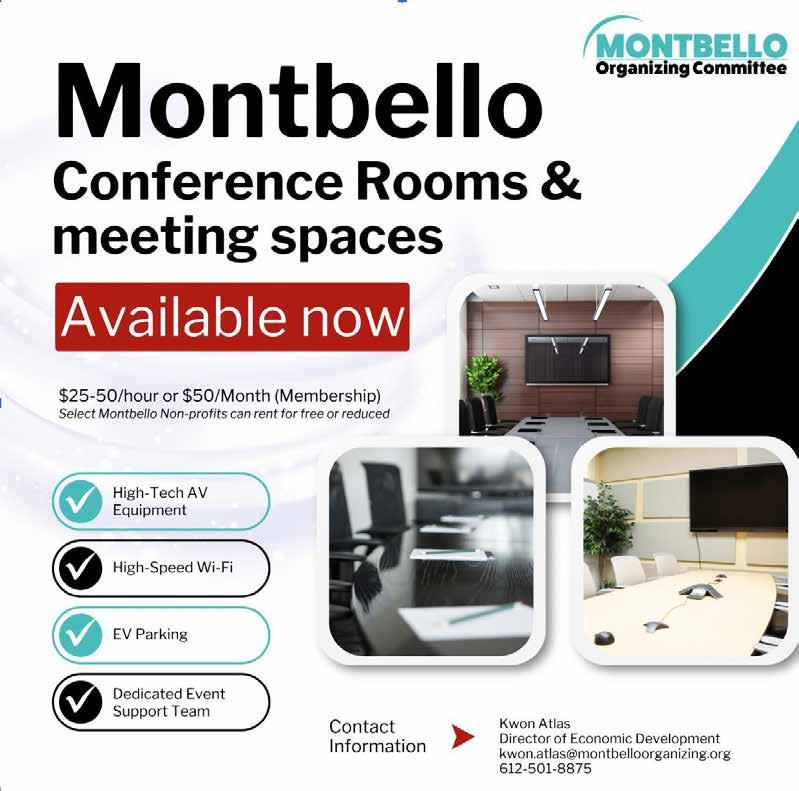
dividirnos o arrebatarnos nuestros derechos, enfrentamos estos desafíos con unidad, compasión y una determinación incansable de construir algo mejor—para nosotros y las generaciones futuras.
Nuestro distrito se define por la manera en que nos amamos y apoyamos mutuamente. Frente a la injusticia sistémica, creamos redes de cuidado. Cuando las instituciones nos fallan, construimos nuestras propias mesas. Como su concejala, veo la brillantez de nuestra gente cada día—en organizaciones comunitarias, programas para jóvenes, encuentros culturales y actos cotidianos de compasión.
El cambio real no viene de fuerzas externas. Comienza con nosotros. Ya sea que participes en una jornada de limpieza, asistas a una reunión vecinal o lleves a un amigo a una asamblea comunitaria, no solo estás participando—estás ayudando a liderar la lucha por la justicia, la responsabilidad y la alegría.
Si no sabes por dónde empezar, mi oficina mantiene un calendario público de eventos locales. Encontrarás el enlace al final de este artículo. Si tienes un evento que quisieras incluir, envíanos un correo a district8@denvergov.org— queremos ayudarte a amplificar tu trabajo.
También tenemos una oportunidad única en una generación para transformar nuestro poder colectivo en algo hermoso y duradero. La ciudad está adquiriendo una parcela de 155 acres que se convertirá en un parque público—justo aquí en el Nordeste de Park Hill. Pero este debe ser nuestro parque, moldeado por tu visión. Eso significa un espacio verde que refleje nuestros va-
lores, programación que sirva a nuestras familias, y un lugar donde podamos reunirnos con alegría, amor y optimismo hacia el futuro.
Asegurémonos de que tu voz guíe este proceso desde el inicio. Mi oficina está trabajando con el equipo del alcalde para hacerlo realidad—por medio de sesiones de escucha, eventos comunitarios, encuestas y más. Juntos, podemos convertir un espacio largamente ignorado en un pilar comunitario vibrante. Participe en el proceso de visión en www.parkhillpark.org.
También viene a votación el Bono de Denver Vibrant GO, una oportunidad para apoyar proyectos de mejora de la ciudad sin aumentar los impuestos. Si tiene la capacidad, puede asistir virtualmente al comité ejecutivo asistir virtualmente al comité ejecutivo. Inscríbase para participar en la sesión de comentarios públicos del comité ejecutivo participar en la sesión de comentarios públicos del comité ejecutivo y defender el paquete completo de proyectos de bonos del Distrito 8. Obtenga más información en denvergov.org/vibrantbond y haga oír su voz. Montbello tiene algunos proyectos interesantes en consideración, como la renovación de la Biblioteca Sucursal de Montbello y el circuito de Montbello.
Así respondemos a la división—con comunidad. Así enfrentamos la injusticia—con una visión colectiva. No solo estamos resistiendo—estamos redefiniendo lo que es posible. Conéctate con mi oficina en https://linktr.ee/shontelmlewis para mostrarle a la ciudad cómo se ve una verdadera comunidad. Y
Sophia S. and Lily B., High School Students and FaithBridge SHIFT Fellows
As a result of recent federal executive orders terminating Diversity, Equity, and Inclusion (DEI) initiatives, critical facts about America’s history—particularly those related to people of color—are also being removed from places like museums, libraries and classrooms across the country. These changes have ignited concern among educators, communities, and especially students, who view history not merely as a subject, but as a mirror of identity, culture, and truth. Two local high school students who participate in the FaithBridge SHIFT Fellowship speak out about the importance of preserving a complete and inclusive historical narrative. Their perspectives underscore the need for all Americans to remember and reflect on all stories—especially those historically overlooked—as a foundation for building a more informed and united future.
Sophia S.

In recent years, and especially in our current political climate, we have misinterpreted the meaning of Diversity, Equity, and Inclusion

(DEI). DEI is not about changing history but finalizing it—to include all those who were once forgotten. Our history is not complete without marginalized groups being represented, and the fact that this often goes unrecognized is a disgrace. As inclusive efforts are being destroyed, changes in educational curricula are underway. Not only are certain books being banned from school libraries, but soon, curricula may only reflect the white side of history, leaving out the Black, Brown, and gray areas.
Holidays such as Cinco de Mayo and Juneteenth are important because they provide all of us the opportunity to learn about and celebrate the history, accomplishments and cultures of marginalized groups who play such a critical role in our communities. I believe it is important to acknowledge two things about these celebrations through the lens of DEI.
Firstly, as new generations enter school, we see a decline in student engagement. While some may blame phones or the students themselves, one major factor that cannot be ignored is the lack of relatability. Children often view the world in a self-serving way—if they don’t see personal relevance in
something, they may choose to disengage. However, when a child sees their culture or heritage reflected in the classroom, they become more engaged because they see themselves in the learning environment.
Secondly, DEI initiatives are not as deeply embedded in our education system as some might suggest. As a senior, I have never completed a project on Cinco de Mayo or Juneteenth. I have never been assigned readings that center on LGBTQ+ inclusion or felt that my school was promoting any specific agenda. Coming from a Colorado school, some might assume DEI dominates our education—but it doesn’t. Instead, we as students choose to educate ourselves about all aspects of our shared history, and we carry that knowledge forward with awareness and unity.
Lily B.
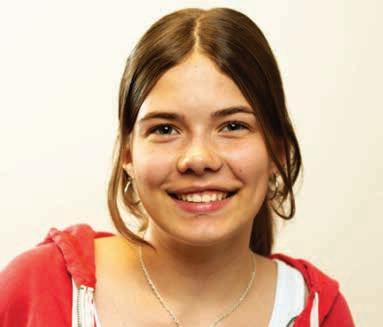
Ultimately, students are the future; eventually, they will
make decisions that impact millions of people. It is imperative to provide students with a comprehensive education—one that includes the histories of underrepresented groups. This knowledge empowers students to make informed decisions that consider the perspectives of people from all walks of life. Unfortunately, much of the history of systematically oppressed communities remains untaught and ignored; it is largely erased from public knowledge.
Given the recent changes in our education system, we are, as a society, moving backward. We are forgetting our past— and without this knowledge and the opportunity to learn from our mistakes, we are bound to repeat them.
Young minds are easy to mold and influence. Without exposure to diverse cultures, peoples, languages, histories, and forms of expression, a new generation of closed-minded individuals will be born—disconnected from the richness of the world and vulnerable to ignorance, fear, and division. With that fear and ignorance, beautiful cultures risk being erased from our memory— forever forgotten.
It is crucial for students to understand that people are not defined solely by their color; each person is enriched by untold histories, immersed in culture, and shaped by lived experiences. Students need to be introduced to the idea that we are all connected—through our minds, cultures, experiences, love, and even hate— whether or not they realize it.
The universe is a boundless void of eternity, and yet here we are—existing together, with the capacity to live and to ex-
Continued on page 10
Continued from page 9 press. Not just students, but all of us must understand: this is all we have. We only have our history and our future. To shape tomorrow, we must first remember where we’ve been.
Editor’s Note: Visit www.faith Editor’s Note: Visit www.faith -bridgeco.org for information bridgeco.org for information on the SHIFT Fellowship. on the SHIFT Fellowship.
Sophia S. y Lily B., Estudiantes de Secundaria y Becarias de FaithBridge SHIFT
Como resultado de recientes órdenes ejecutivas federales que terminan con las iniciativas de Diversidad, Equidad e Inclusión (DEI, por sus siglas en inglés), hechos críticos sobre la historia de los Estados Unidos—particularmente aquellos relacionados con personas de color—también están siendo eliminados de lugares como museos, bibliotecas y aulas en todo el país. Estos cambios han generado preocupación entre educadores, comunidades y, especialmente, estudiantes, quienes ven la historia no solo como una asignatura, sino como un reflejo de la identidad, la cultura y la verdad. Dos estudiantes de secundaria locales que participan en la beca FaithBridge SHIFT alzan la voz sobre la importancia de preservar una narrativa histórica completa e inclusiva. Sus perspectivas subrayan la necesidad de que todos los estadounidenses recuerden y reflexionen sobre todas las historias—especialmente aquellas que históricamente han sido pasadas por alto—
como base para construir un futuro más informado y unido.
Sophia S.
En los últimos años, y especialmente en el clima político actual, hemos malinterpretado el significado de Diversidad, Equidad e Inclusión (DEI). La DEI no se trata de cambiar la historia, sino de culminarla—para incluir a todos aquellos que alguna vez fueron olvidados. Nuestra historia no está completa sin la representación de los grupos marginados, y el hecho de que esto a menudo pase desapercibido es una vergüenza. Mientras se destruyen los esfuerzos inclusivos, se están implementando cambios en los planes de estudio. No solo se están prohibiendo ciertos libros en las bibliotecas escolares, sino que pronto, los planes de estudio podrían reflejar solo el lado blanco de la historia, dejando de lado las áreas Negras, Morenas y Grises.
Festividades como el Cinco de Mayo y el Juneteenth son importantes porque nos brindan la oportunidad de aprender y celebrar la historia, los logros y las culturas de los grupos marginados que desempeñan un papel fundamental en nuestras comunidades. Creo que es importante reconocer dos aspectos de estas celebraciones desde la perspectiva de la DEI.
En primer lugar, a medida que las nuevas generaciones ingresan a la escuela, observamos una disminución en la participación estudiantil. Si bien algunos culpan a los teléfonos o a los propios estudiantes, un factor importante que no se puede ignorar es la falta de empatía. Los niños suelen ver el mundo de forma egoísta: si no
ven relevancia personal en algo, pueden optar por desvincularse. Sin embargo—cuando un niño ve su cultura o herencia reflejada en el aula, se involucra más porque se reconoce a sí mismo en el entorno de aprendizaje.
En segundo lugar, las iniciativas de DEI no están tan arraigadas en nuestro sistema educativo como algunos sugieren. Como estudiante de último año, nunca he completado un proyecto sobre el Cinco de Mayo ni sobre Juneteenth. Nunca me han asignado lecturas centradas en la inclusión LGBTQ+ ni he sentido que mi escuela promoviera una agenda específica. Al venir de una escuela de Colorado, algunos podrían asumir que la DEI domina nuestra educación, pero no es así. En cambio, como estudiantes, elegimos educarnos sobre todos los aspectos de nuestra historia compartida y transmitimos ese conocimiento con consciencia y unidad.
En última instancia, los estudiantes son el futuro; con el tiempo, tomarán decisiones que impactarán a millones de personas. Es imperativo brindarles una educación integral— que incluya las historias de los grupos subrepresentados. Este conocimiento les permite tomar decisiones informadas que consideran las perspectivas de personas de todos los ámbitos. Desafortunadamente, gran parte de la historia de las comunidades sistemáticamente oprimidas permanece desapercibida e ignorada; se encuentra prácticamente borrada del conocimiento público.
Dados los recientes cambios en nuestro sistema educativo, como sociedad, estamos retrocediendo. Estamos olvidando nuestro pasado—y sin este conocimiento y la oportunidad de aprender de nuestros errores, estamos condenados a repetirlos.
Las mentes jóvenes son fáciles de moldear e influenciar. Sin exposición a diversas culturas, pueblos, idiomas, historias y formas de expresión, nacerá una nueva generación de individuos de mente cerrada—desconectados de la riqueza del mundo y vulnerables a la ignorancia, el miedo y la división. Con ese miedo e ignorancia, las bellas culturas corren el riesgo de ser borradas de nuestra memoria—olvidadas para siempre.
Es crucial que los estudiantes comprendan que las personas no se definen solo por su color de piel; cada persona se enriquece con historias inéditas, está inmersa en la cultura y moldeada por las experiencias vividas. Es necesario introducir a los estudiantes en la idea de que todos estamos conectados —a través de nuestras mentes, culturas, experiencias, amor e incluso odio—aunque no se den cuenta.
El universo es un vacío infinito de eternidad, y sin embargo, aquí estamos, existiendo juntos, con la capacidad de vivir y expresarnos. No solo los estudiantes, sino todos debemos entender: esto es todo lo que tenemos. Solo tenemos nuestra historia y nuestro futuro. Para forjar el mañana, primero debemos recordar dónde hemos estado. Y
Nota del Editor: Visite a Nota Editor: Visite a www.faithbridgeco.org www.faithbridgeco.org para para information sobre el SHIFT Fel information sobre el SHIFT Fel -lowship. lowship.
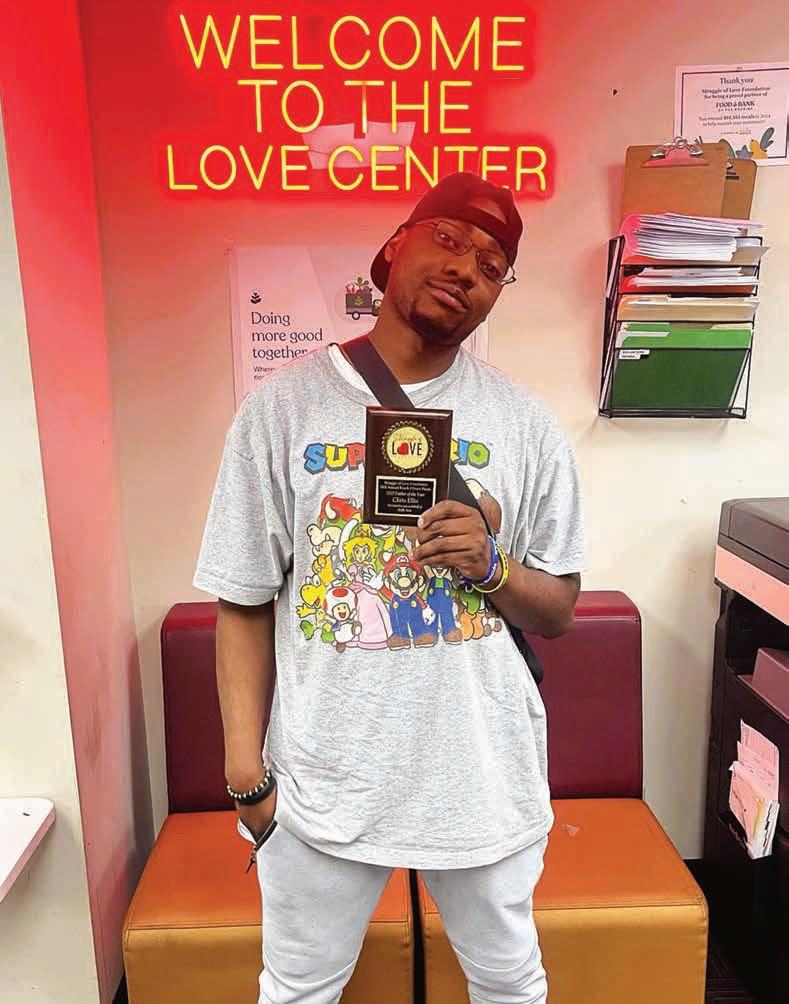
LaKeshia Hodge, Struggle of Love Foundation Executive Director
Each year, the Struggle of Love Foundation honors the strength, love, and leadership of the incredible fathers in our community during the Reach for Peace Picnic, held annually on Father’s Day. This year, three fathers were recognized with the Father of the Year award: Trevor Bourne, Chris Ellis and Elon Hodge-Jones. Each was celebrated for their strength, courage, compassion and the example they set for their children and the young people in our community. A statement in the nomination form for Chris Ellis illustrates the important role fathers play
LaKeshia Hodge, Directora Ejecutiva de la Foundation Struggle of Love
Cada año, la organización Struggle of Love Foundation (Fundación de la Lucha de Amor) rinde homenaje a la fortaleza, el amor y el liderazgo de los padres increíbles de nuestra comunidad durante el picnic Reach for Peace, que se celebra anualmente el Día del Padre. Este año, tres padres fueron reconocidos con el premio “Padre del Año”: Trevor Bourne, Chris Ellis y Elon Hodge-Jones. Cada uno fue celebrado por su fortaleza, valentía, compasión y por el ejemplo que representan para sus hijos y para la juventud de nuestra comunidad. Una declaración en el formulario de nominación de Chris Ellis ilus-
tra el papel fundamental que desempeñan los padres en la vida de sus hijos:
“Creo que Chris Ellis debería ser el Padre del Año por cómo se representa a sí mismo como hombre y como padre. Lo que he visto es a un hombre negro entregándose completamente a su hijo para asegurarse de que su hijo, aunque sea pequeño, recuerde que es un rey, sin importar lo que pase.”
Docenas de familias disfrutaron de comida gratis, juegos y entretenimiento en el 18º picnic anual Reach for Peace. El tema de este año fue “el ritmo de los 90” y uno de los momentos más destacados del día fue una competencia de baile con temática de los años 90.
Animamos a todos a expresar un sincero agradecimiento a los héroes cotidianos que marcan la diferencia en la vida de sus hijos y en la comunidad en general. Y
in the lives of their children, “I believe that Chris Ellis should be Father of the Year because of how he represents himself as a man, and how he represents himself as a father. What I’ve seen is a Black man pouring himself into his son to make sure that his son, although young, remembers that he’s a king—no matter what.”
Dozens of families enjoyed free food, games, and entertainment at the 18th annual Reach for Peace Picnic. The theme for this year’s Picnic was “90s groove” and one of the highlights of the day was a 1990s themed dance competition.
We encourage everyone to show heartfelt appreciation for the everyday heroes making a difference in the lives of their children and the broader community.

Donna M. Garnett, CEO, Montbello Organizing Committee and Project Director, FreshLo Initiative
How does one measure impact? How do we know that our efforts actually make a difference – at least the difference we intended to make?
In the instance of the FreshLo Hub at 12444 Albrook Drive, we look at many numbers to calculate the impact that is being made and much of that impact translates into dollars and cents. From that perspective, the partial list of critical numbers below are key factors to pay attention to. The numbers go beyond the costs and ROI (Return on Investment) that investors are eager to capture.
Real people, real neighborhoods are deeply impacted. The following are some of the critical numbers that are held out as measures of the impact of the FreshLo Hub development. These numbers matter mightily to the government agencies and the private investors who have contributed to the project.
$54,000,000 – Cost of constructing the FreshLo Hub, which includes affordable housing, a mental health center, and a business incubator.
2,500 – Residents who participated in a community engagement process to dream a vision for the FreshLo Hub
5.5 – Years it took to raise the money, buy the site, go through the city permitting process, build the building, lease the units, and build out the business incubator
538 – Number of people

who were employed in the construction of the FreshLo Hub. A third of whom are people of color, and many were from the Montbello neighborhood
97 – Number of affordable housing units at 30%, 40%, 60% and 70% area median income included in the Hub
99 – Years that the FreshLo Hub is required to maintain affordable rent rates
18 – Months it took to build the Hub from groundbreaking to completion
210 – People (children, youth, adults, seniors) who call the FreshLo Hub home
While these are important measures and translate into foundations for Montbello Organizing Committee to lever-
3 para obtener más información sobre el impacto diario en las vidas de las personas que forman parte del FreshLo Hub.
¿Cómo se mide el impacto? ¿Cómo sabemos que nuestros esfuerzos realmente marcan la diferencia, al menos la que pretendíamos marcar?
En el caso del FreshLo Hub en 12444 Albrook Drive, analizamos diversas cifras para calcular el impacto, y gran parte de ese impacto se traduce en dinero. Desde esa perspectiva, la lista parcial de cifras críticas a continuación son factores clave a tener en cuenta. Las cifras van más allá de los costos y el ROI (retorno de la inversión) que los inversionistas buscan obtener.
age more funds to address issues such as the need for affordable housing and access to liveable wage jobs, they are not the sum total of impact.
Please see From The Editor’s Tablet on page 3 to learn more of the day-to-day impact on the lives of the people who are part of the FreshLo Hub.
Donna M. Garnett, Directora Ejecutiva del Comité Organizador de Montbello y Directora de Proyectos de la Iniciativa FreshLo
Consulte la sección Desde la Tableta del Editor en la página
Las personas y los vecindarios reales se ven profundamente afectados. A continuación, se presentan algunas de las cifras críticas que se presentan como medidas del impacto del desarrollo del FreshLo Hub. Estas cifras son de suma importancia para las agencias gubernamentales y los inversionistas privados que han contribuido al proyecto.
$54,000,000 – Costo de la construcción del FreshLo Hub, que incluye viviendas asequibles, un centro de salud mental y una incubadora de empresas
2,500 – residentes que participaron en un proceso de participación comunitaria para crear una visión para el FreshLo Hub. Se necesitaron 5,5 años para recaudar los fondos, comprar el terreno, tramitar los permisos municipales, construir el edificio, arrendar las unidades y desarrollar la incubadora de empresas
538 – personas empleadas en la construcción del FreshLo Hub. Un tercio de ellas son
personas de color, muchas de ellas del barrio de Montbello
97 – unidades de vivienda asequible con ingresos del 30%, 40%, 60% y 70% de la mediana de la zona, incluidas en el Hub
99 – años que el FreshLo Hub debe mantener alquileres asequibles
18 – meses para construir el Hub desde la colocación de la primera piedra hasta su finalización
210 – personas (niños, jóvenes, adultos, adultos mayores) que consideran el FreshLo Hub su hogar
Si bien estas medidas son importantes y sientan las bases para que el Comité Organizador de Montbello gestione más fondos para abordar problemas como la necesidad de vivienda asequible y el acceso a empleos con salarios dignos, no representan la totalidad del impacto.
Consulte la sección Desde la Tableta del Editor en la página 3 para obtener más información sobre el impacto diario en las vidas de las personas que forman parte del FreshLo Hub. Y
Since the tragic death of George Floyd in May 2020, cities across the country have taken a closer look at racism and injustice. In Denver, this sparked meaningful action— driven by community voices, local leaders, and advocacy groups—toward building a more equitable city.
As national conversations around civil rights and justice continue, recent federal actions

have introduced significant changes to Diversity, Equity, and Inclusion (DEI) policies, potentially affecting laws and individual rights. In this evolving landscape, Denver’s efforts to reform policing, support communities, and promote accountability are more important than ever.
In June 2020, both the Denver Police Department (DPD) and the State of Colorado responded to widespread demands for change. DPD banned chokeholds, mandated body camera use during all SWAT operations and required reporting whenever officers point firearms. Complementing this, Colorado passed Senate Bill 20-217, banning chokeholds, limiting tear gas use, eliminating qualified immunity for officers, and mandating statewide body camera use by 2023.
Denver also launched the Support Team Assisted Response (STAR) program, sending mental health professionals
and paramedics instead of police to non-violent calls. STAR aims to provide compassionate, appropriate responses to mental health crises.
Established in December 2022, the Mayor’s Office of Social Equity & Innovation (OSEI) works to dismantle systemic inequities and create inclusive policies for historically marginalized populations. Their mission centers on ensuring that social identity does not determine life outcomes.
The Denver Justice Project, a nonprofit organization, continues to advocate for transformative justice through community engagement, policy change, and initiatives that support public health and safety.
In February 2025, Denver reached a $2.5 million settlement with 13 Black Lives Matter protesters who reported
excessive force during the 2020 demonstrations. The settlement underscores the city’s commitment to accountability and transparency in law enforcement.
Efforts to build trust between the community and police have included policy updates, enhanced training, and improved communication with the public.
Cultural and Educational Engagement Organizations like History Colorado are working to preserve and share the stories of African Americans in the West. Through education and cultural programming, they aim to deepen understanding and appreciation of Black heritage in the region.
While progress has been made, the journey toward justice and equity is ongoing.
Denver’s continued commitment to listening, learning, and acting remains essential in shaping a more just future for all. Y
Desde la trágica muerte de George Floyd en mayo de 2020, ciudades de todo el país han examinado más de cerca el racismo y la injusticia. En Denver, esto impulsó acciones significativas —lideradas por voces comunitarias, líderes locales y grupos de defensa— con el objetivo de construir una ciudad más equitativa.
A medida que las conversaciones nacionales sobre los derechos civiles y la justicia continúan, acciones federales recientes han introducido cambios importantes en las políticas de Diversidad, Equidad e Inclusión (DEI), lo que podría afectar leyes y derechos individuales. En este contexto cambiante, los esfuerzos de Denver por reformar la policía, apoyar a las comunidades y promover la rendición de cuentas son más importantes que nunca.
Reformas Policiales
En junio de 2020, tanto el Departamento de Policía de Denver (DPD) como el Estado de Colorado respondieron a las amplias demandas de cambio.
El DPD prohibió las llaves de estrangulamiento, ordenó el uso de cámaras corporales en todas las operaciones SWAT y exigió reportes cada vez que un oficial apuntara con un arma de fuego. Complementando esto, Colorado aprobó el Proyecto de Ley del Senado 20-217, que prohíbe las llaves de estrangulamiento, limita el uso de gas lacrimógeno, elimina la inmunidad calificada para oficiales y exige el uso de cámaras corporales en todo el estado para 2023.
Denver también lanzó el programa Support Team Assisted Response (STAR), por sus siglas en inglés) y Respuesta Asistida por el Equipo de Soporte (ESTRELLA, en Espanol), que envía profesionales de salud mental y paramédicos — en lugar de pólizas para atender llamadas que no son violentas. STAR busca brindar respuestas compasivas y adecuadas a crisis de salud mental.
Iniciativas Comunitarias e Institucionales
Establecida en diciembre de 2022, la Oficina del Alcalde para la Equidad Social e Innovación (OSEI, por sus siglas en inglés) trabaja para desmantelar desigualdades sistémicas y crear pólizas inclusivas para poblaciones históricamente

marginadas. Su misión se centra en asegurar que la identidad social no determine los resultados de vida.
El Proyecto de Justicia de Denver, una organización sin fines de lucro, continúa promoviendo una justicia transformadora mediante la participación comunitaria, el cambio de pólizas y programas que apoyan la salud y seguridad pública.
Responsabilidad Legal y Transparencia
En febrero de 2025, Denver llegó a un acuerdo de $2.5 millones con 13 manifestantes del movimiento Black Lives Matter (Las Vidas de los Afroamericanos Importan) que denunciaron el uso excesivo de la fuerza durante las protestas de 2020. Este acuerdo resalta el compromiso de la ciudad con la rendición de cuentas y la transparencia en la aplicación de la ley.
Los esfuerzos para construir confianza entre la comunidad y la policía han incluido actualizaciones de pólizas, capacitación mejorada y una comunicación más efectiva con el público.
Participación Cultural y Educativa
Organizaciones como History Colorado (Historia de Col-
orado) trabajan para preservar y compartir las historias de los Afroamericanos en el oeste del país. A través de la educación y la programación cultural, buscan profundizar el entendimiento y la valoración del patrimonio afroamericano en la región.
Si bien se han logrado avances, el camino hacia la justicia y la equidad continúa. El compromiso constante de Denver con escuchar, aprender y actuar sigue siendo esencial para construir un futuro más justo para todos. Y
Mary Ann Bash, Founder Parents for Parity and Each One Teach One
Kids love and need the outdoors. Want to inspire them to read and write? Take them to the garden. When first and second graders from Marie L. Greenwood Elementary went on a plant and tree scavenger hunt, they had no difficulty identifying plants – they read the labels. The little scientists observed leaf characteristics and then read the tree signage to learn the common name of 16 trees donated by The Park


People (see MUSE article in Sept/Oct. 2024 issue). They were totally engaged writing tree names on their “zine.”
Now they have a tool for teaching others about the shade trees – stewardship in the making.
After the magic of discovering growing plants, it was their turn to plant tomato, pepper, eggplant and zinnia seedlings donated by the Montbello Organizing Committee’s Children’s Farms in Action. They also completed plant labels to document their contribution. They will be shocked when they return in the fall to harvest fruits and vegetables from their mature plants.
When the excitement of the horticultural activity waned, the kids quietly read “science in the garden” books, embraced by the oxygen-producing greenery. When a third grade teacher once asked what she could do late in the school year to capture the attention of the students who were squirrely and unfocused in the classroom, 105-year-old Marie L. Greenwood, who taught first grade from 1935-1974, reminded her, “The great outdoors is where children learn best.” Spring planting proved once again Mrs. Greenwood’s deep knowledge of children –no matter the era.
Editor’s note: to learn more
Editor’s note: to learn more about Parents for Parity, visit about Parents for Parity, visit their Facebook page: their Facebook page: https://www.facebook.com/p https://www.facebook.com/p arentsforparity arentsforparity
Llévalos al jardín. Cuando los alumnos de primero y segundo grado de la Escuela Primaria Marie L. Greenwood participaron en una búsqueda del tesoro de plantas y árboles, no tuvieron dificultad para identificarlos: leyeron las etiquetas. Los pequeños científicos observaron las características de las hojas y luego leyeron la señalización de los árboles para aprender el nombre común de 16 árboles donados por The Park People (Las Personas del Parque). Vea el artículo de MUSE en la edición de septiembre/octubre de 2024.
bello. También completaron las etiquetas de las plantas para documentar su contribución. Se sorprenderán al regresar en otoño a cosechar frutas y verduras de sus plantas maduras.
Cuando la emoción de la actividad hortícola se desvaneció, los niños leyeron en silencio libros de “ciencia en el jardín”, abrazados por la vegetación oxigenante. Cuando una maestra de tercer grado le preguntó qué podía hacer al final del año escolar para captar la atención de los estudiantes inquietos y desenfocados en el aula, Marie L. Greenwood, de 105 años y quien enseñó primer grado de

Niños Encuentran
Mary Ann Bash, Fundadora de Padres por la Paridad y Cada Uno Enseña a Uno
A los niños les encanta y necesitan el aire libre. ¿Quieres inspirarlos a leer y escribir?
Se involucraron por completo escribiendo los nombres de los árboles en sus “revistas”. Ahora tienen una herramienta para enseñar a otros sobre los árboles de sombra: un cuidado en ciernes.
Después de la magia de descubrir el crecimiento de las plantas, les tocó plantar plántulas de tomate, pimiento, berenjena y zinnia donadas por Granjas Infantiles en Acción del Comité Organizador de Mont-
1935 a 1974, le recordó: “Al aire libre es donde los niños aprenden mejor”. La siembra de primavera demostró una vez más el profundo conocimiento que la Sra. Greenwood tenía de los niños, sin importar la época. Y
Nota del Editor: Para obtener Nota del Editor: Para obtener más información sobre Padres más información sobre Padres por la Paridad, visite su pá por la Paridad, visite su pá -gina de Facebook: gina de Facebook: https://www.facebook.com/p https://www.facebook.com/p arentsforparity arentsforparity

Leo Lopez, MOC Asst. Director of Economic Development
With rising prices and growing conversations around a potential recession, it’s no surprise that many families in our community are feeling uneasy about the future. During difficult times like these, it’s more important than ever to lean on the financial basics— simple, everyday habits that can help you stay grounded and in control. The FDIC’s Money Smart for Adults program offers free tools to help you take control of your money, one step at a time. Start with Your Financial Values
Understanding what matters most to you can guide your financial choices. Do you want to save for your kids’ future? Pay off debt? Take a moment to reflect on your goals— Money Smart Module 1 helps you do just that.
Track your income and spending to get a clear picture of where your money goes (Module 3). This makes it easier to adjust your budget (Module 4) and start saving, even if it’s just a few dollars each week.
Build a Small Emergency Fund
Life happens—your car breaks down or a bill comes out of nowhere. Having a savings cushion helps you avoid falling into debt. Module 5 shows ways to save, even with limited income.
Managing debt (Module 8) and exploring ways to increase your income can help you stay afloat during uncertain times. This could mean picking up extra hours, freelance work, or learning new job skills.
Economic downturns can make retirement investors nervous, but reacting out of fear can hurt more than help. If you have a retirement account like a 401(k) or IRA, resist the urge to make emotional deci-
sions. Instead, speak to a certified financial advisor. They can help you review your goals and adjust your portfolio based on your time to retirement—such as shifting toward more stable options like bonds as you get closer to retirement age.
To explore more free financial education resources, visit the FDIC’sMoney Smart for Adults website at www.fdic.gov.
Leo Lopez, Subdirector de Desarrollo Económico, MOC
Con el aumento de los precios y las crecientes conversaciones sobre una posible recesión, no es sorpresa que muchas familias en nuestra comunidad se sientan inquietas sobre el futuro. En momentos difíciles como estos, es más importante que nunca apoyarse en los fundamentos financieros: hábitos simples y cotidianos que pueden ayudarte a mantenerte firme y con el control en tus manos. El programa Money Smart for Adults de la FDIC ofrece herramientas gratuitas para ayudarte a tomar el control de tu dinero, paso a paso. Comienza con tus Valores Financieros
Entender lo que más te importa puede guiar tus decisiones financieras. ¿Quieres ahorrar para el futuro de tus hijos? ¿Pagar tus deudas? Tómate un momento para reflexionar sobre tus metas—el Módulo 1 de Money Smart te ayuda a hacerlo.
Conoce tus Números
Lleva un registro de tus ingresos y gastos para tener una visión clara de a dónde va tu dinero (Módulo 3). Esto facilita ajustar tu presupuesto (Módulo 4) y comenzar a ahorrar, aunque sea solo unos pocos dólares a la semana.
Crea un Pequeño Fondo de Emergencia
La vida sucede—se descompone el auto o aparece un gasto inesperado. Tener un ahorro de respaldo te ayuda a evitar endeudarte. El Módulo 5 muestra formas de ahorrar, incluso con ingresos limitados.
Enfrenta tus Deudas y Protege tus Ingresos
Manejar tus deudas (Módulo 8) y explorar maneras de aumentar tus ingresos puede ayudarte a mantenerte a flote en tiempos inciertos. Esto puede incluir trabajar horas extras, hacer trabajos independientes o aprender nuevas habilidades laborales.
Mantén la Calma con tus Inversiones a Largo Plazo
Las recesiones económicas pueden preocupar a quienes tienen fondos de retiro, pero actuar con miedo puede hacer más daño que bien. Si tienes una cuenta de retiro como un 401(k) o IRA, resiste el impulso de tomar decisiones emocionales. Habla con un asesor financiero certificado. Ellos pueden ayudarte a revisar tus metas y ajustar tu portafolio según el tiempo que te falte para retirarte—como cambiar hacia opciones más estables, como bonos, a medida que te acercas a la edad de jubilación. Para explorar más recursos gratuitos de educación financiera, visita el sitio web Money Smart for Adults de la FDIC en www.fdic.gov. Y
Donna M. Garnett, CEO, Montbello Organizing Committee
Montbello’s communitybased nonprofit organizations are the lifeblood of this community. Responding to the critical and often urgent needs of residents, filling the gap where government can’t or won’t, small nonprofits and even midsized nonprofits struggle with a host of challenges. Over the last eight years, Montbello Organizing Committee (MOC) has shepherded several new and existing nonprofits by providing coaching, fiscal sponsorship, and shared office space. MOC staff and board members have decades of experience creating and sustaining nonprofits with annual budgets that range from under $100,000 to multi-millions. In these uncertain times, nonprofits and the people and causes they serve are at greater risk in every regard than we have been in the last fifty years.
In response to numerous nonprofits seeking support, MOC announces the launch of the Nonprofit Leadership Center (NLC). The NLC offers a place where nonprofits can: alease affordable office space with Internet access and training/meeting spaces
a access training and technical assistance
a receive support in incorporating as a Colorado nonprofit and filing for federal 501c3 status
a work under MOC’s fiscal oversight

a participate in aggregated data capture, analysis, and reporting
a form collaborative partnerships with other likeminded organizations
Currently, the NLC has eight office spaces, with four of those still available for an annual lease. The training and meeting spaces are available for a nominal fee and can accommodate groups of 20 to 30 participants. These spaces are available during the day, evenings, and weekends.
Training modules, which will be delivered in 1 to 2-day sessions, will commence in September. Topics include:
l Nonprofit Management
l Grant Writing A–Z
l Building Strategic Plans
l Establishing Financial Infrastructure
l Building Collaborative Partnerships
l Accountability and Evaluation Approaches
l Building Strong Boards
l Diversifying Funding Streams
Individuals and nonprofit organizations interested in being a part of the NLC can
reach out to andres.carrera@montbelloorganizing.org for more information.
Donna M. Garnett, Directora Ejecutiva, Comité Organizador de Montbello
Las organizaciones comunitarias sin fines de lucro de Montbello son el alma de esta comunidad. Al responder a las necesidades críticas y, a menudo, urgentes de los residentes, y al llenar el vacío donde el gobierno no puede o no quiere intervenir, las pequeñas e incluso medianas organizaciones sin fines de lucro enfrentan una gran cantidad de desafíos. Durante los últimos ocho años, el Comité Organizador de Montbello (MOC, por sus siglas en inglés) ha guiado a varias organizaciones sin fines de lucro nuevas y existentes al proporcionarles aseso-
ramiento, patrocinio fiscal y espacios de oficina compartidos. El personal y los miembros de la junta de MOC cuentan con décadas de experiencia en la creación y sostenimiento de organizaciones sin fines de lucro con presupuestos anuales que van desde menos de $100,000 hasta varios millones. En estos tiempos inciertos, las organizaciones sin fines de lucro, junto con las personas y causas que apoyan, enfrentan mayores riesgos en todos los aspectos que en los últimos cincuenta años.
En respuesta a numerosas organizaciones que buscan apoyo, MOC anuncia el lanzamiento del Centro de Liderazgo para Organizaciones sin Fines de Lucro (NLC, por sus siglas en inglés). El NLC ofrece un espacio donde las organizaciones pueden:
a alquilar oficinas a precios accesibles con acceso a Internet y salas para capacitación/reuniones a acceder a capacitación y asistencia técnica a recibir apoyo para constituirse como organización sin
Continued on page 18
Continued from page 17 fines de lucro en Colorado y solicitar el estatus federal 501(c)(3)
a trabajar bajo la supervisión fiscal de MOC a participar en la recopilación, análisis y reporte de datos consolidados
a formar alianzas colaborativas con otras organizaciones afines
Actualmente, el NLC cuenta con ocho espacios de oficina, de los cuales aún hay cuatro disponibles para renta anual. Las salas de capacitación y reuniones están disponibles por una tarifa nominal y pueden albergar grupos de 20 a 30 personas. Estos espacios están disponibles durante el día, en las noches y los fines de semana.
Los módulos de capacitación, que se impartirán en sesiones de 1 a 2 días, comenzarán en septiembre.
Los temas incluirán:
l Gestión de Organizaciones sin Fines de Lucro
l Redacción de Propuestas de Financiamiento de la A a la Z
l Desarrollo de Planes Estratégicos
l Establecimiento de Infraestructura Financiera
l Construcción de Alianzas Colaborativas
l Responsabilidad de Evaluación y Rendición de Cuentas
l Fortalecimiento de Juntas Directivas
l Diversificación de Fuentes de Financiamiento
Las personas y organizaciones interesadas en formar parte del NLC pueden comunicarse con andres.carrera@montbelloorganizing.org para obtener más información. Y
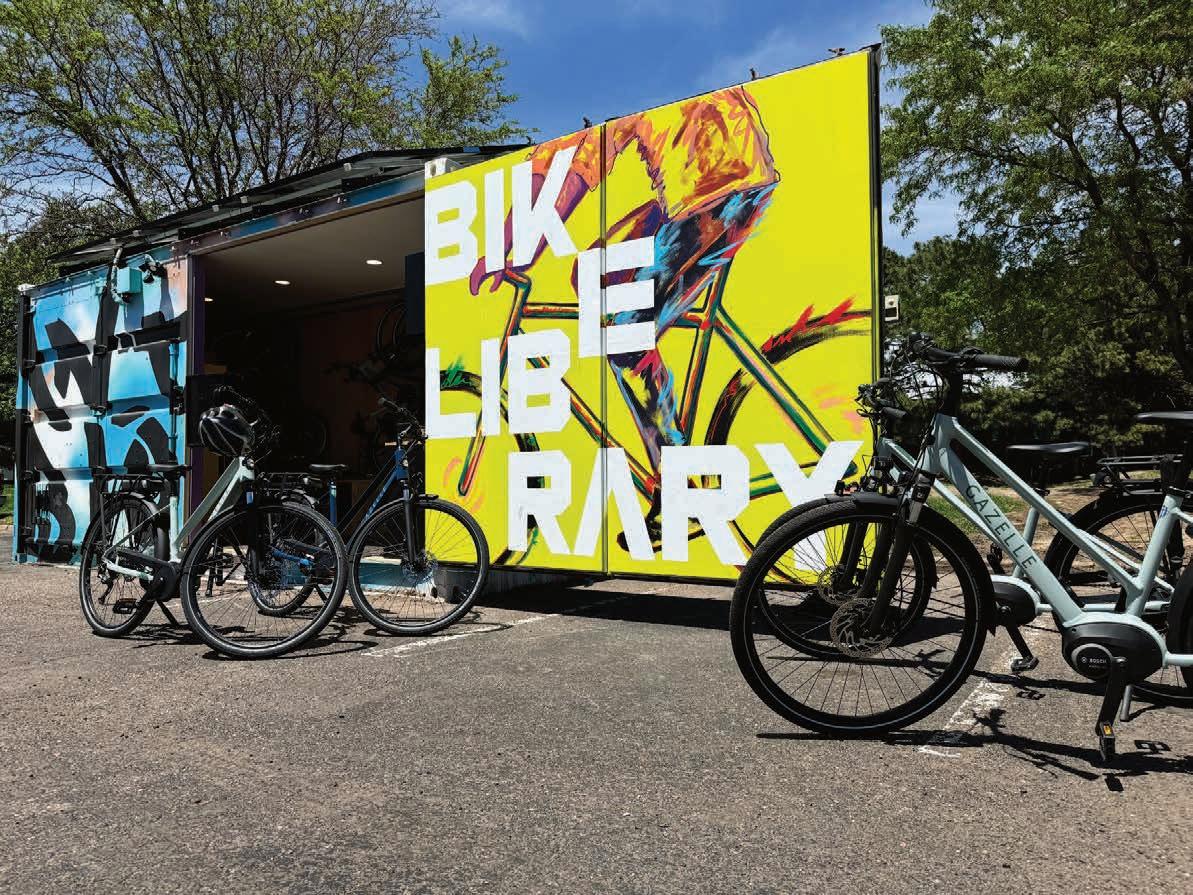
Denver’s e-bike rebate program continues in 2025, offering income-qualified residents significant savings on electric bikes. The initiative aims to promote sustainable transportation and reduce carbon emissions by making e-bikes more accessible.
This year, the program is exclusively available to incomequalified individuals and those requiring adaptive e-bikes. Eligible applicants can receive up to $450 from the city, which can be combined with the State of Colorado’s $450 e-bike tax credit, totaling up to $900 in savings. However, the combined rebate cannot exceed 80 percent of the e-bike’s purchase price, excluding sales tax. For example, if your e-
mum of $800.
The program utilizes a rebate voucher, which is a pointof-sale rebate applied to the price of an e-bike from a participating bike shop. This means the rebate amount is deducted from the price of the bike when you buy it. You don’t have to submit a receipt and get reimbursed after the purchase.
Vouchers are released on a first-come, first-served basis at 11a.m. on the following dates:
•Tuesday, July 29
•Tuesday, September 30
•Tuesday, November 25
To apply, residents must provide proof of Denver residency and meet specific income criteria, such as having a household income below 100 percent of the state’s median income or below 200 percent of the federal poverty level. Applicants are encouraged to create an account and upload necessary documents in ad-
For more information and to apply, visit www.denvergov.org.
embolsos
cletas
El programa de reembolsos para bicicletas eléctricas de Denver continúa en 2025, ofreciendo a los residentes con ingresos que califican ahorros significativos en bicicletas eléctricas. La iniciativa busca promover el transporte sostenible y reducir las emisiones de carbono al hacer que las bicicletas eléctricas sean más accesibles.
Este año, el programa está disponible exclusivamente para personas con ingresos que cumplen los requisitos y qui-
enes requieren bicicletas eléctricas adaptadas. Los solicitantes elegibles pueden recibir hasta $450 de la ciudad, que se pueden combinar con el crédito fiscal de $450 para bicicletas eléctricas del Estado de Colorado, lo que representa un ahorro total de hasta $900. Sin embargo, el reembolso combinado no puede superar el 80% del precio de compra de la bicicleta eléctrica, sin incluir el impuesto sobre las ventas. Por ejemplo, si su bicicleta eléctrica cuesta $1,000, el cupón y el crédito fiscal cubrirán un máximo de $800.
El programa utiliza un cupón de reembolso, que consiste en un descuento en el punto de venta que se aplica al precio de una bicicleta eléctrica en una tienda de bicicletas participante. Esto significa que el importe del reembolso se descuenta del precio de la bici-
cleta al comprarla. No es necesario presentar un recibo y se recibe el reembolso después de la compra.
Los cupones se entregarán por orden de llegada a las 11 a. m. en las siguientes fechas:
•Martes, Julio 29
•Martes, Septiembre 30
•Martes, Noviembre 25
Para solicitar, los residentes deben presentar comprobante de residencia en Denver y cumplir con criterios de ingresos específicos, como tener un ingreso familiar inferior al 100 % del ingreso medio estatal o al 200 % del nivel federal de pobreza. Se recomienda a los solicitantes crear una cuenta y subir la documentación necesaria con antelación para agilizar el proceso de solicitud.
Para obtener más información y aplicar, visite a http://www.denvergov.org.Y
Ride Free: E-Bike Rentals Roll into Far Northeast Denver
Chris Urias, MOC Director of Community Development
The Montbello E-Bike Library, led by the Montbello Organizing Committee, offers free access to electric bikes for residents of Far Northeast Denver. The program supports mobility equity by making clean, convenient transportation available to those living in zip codes 80239, 80249, and 80238. Community members can borrow e-bikes for errands, commuting, or recreation with no cost to participate. The library is part of a larger effort to address transportation barriers, improve public health, and reduce emissions. By empowering residents with sustainable transportation options, the Montbello E-Bike Library is moving the community toward a healthier, more connected future.
Viaja Gratis: El Alquiler de Bicicletas Eléctricas Llega al Extremo Noreste de Denver
Chris Urias, Director de Desarrollo Comunitario del MOC
La Biblioteca de Bicicletas Eléctricas (E-Bikes) de Montbello, dirigida por el Comité Organizador de Montbello, ofrece acceso gratuito a bicicletas eléctricas a los residentes del Extremo Noreste de Denver. El programa promueve la equidad en la movilidad al poner a disposición de quienes viven en los códigos postales 80239, 80249 y 80238 un transporte limpio y conveniente. Los miembros de la comunidad pueden tomar prestadas bicicletas eléctricas para hacer recados, desplazarse o para actividades recreativas sin costo alguno. La biblioteca forma parte de un esfuerzo mayor para abordar las barreras del transporte, mejorar la salud pública y reducir las emisiones. Al brindar opciones de transporte sostenible a los residentes, la Biblioteca de Bicicletas Eléctricas de Montbello impulsa a la comunidad hacia un futuro más saludable y conectado.

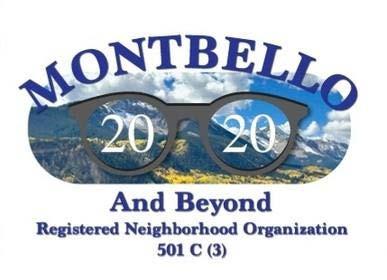


Free School Supplies & Backpacks while supplies last Health screenings, prize drawings, free food, various resources available, Kids Zone, games. For more information contact montbello2020rno.org




Útiles escolares y mochilas gratis hasta agotar existencias Exámenes de salud, sorteos de premios, comida gratis, varios recursos disponibles, Zona de hijos, juegos.
Para obtener más información, comuníquese con montbello2020rno.org
Sofi De La Mora, Branch Supervisor, Montbello Library
On July 12th, the Denver Public Library proudly celebrated a major milestone—the 50th anniversary of the Montbello Branch. Since opening its doors in 1975, the Montbello Library has served as a vital gathering place, learning hub, and source of connection for generations of families in this vibrant and resilient community.
The celebration brought together families, longtime library users, city agencies, and local organizations to reflect on the library’s impact and honor its legacy. Over the past five decades, Montbello Library has remained deeply rooted in the neighborhood, providing services and programs that respond to the evolving needs of its community.
From early literacy storytimes and creative maker projects in the ideaLAB, to the vital support offered through the weekly Plaza program, Montbello Library continues to be a space where everyone is welcome to explore, learn, and grow. The branch has fostered strong partnerships with nonprofits such as Environmental Learning for Kids (ELK), Montbello Organizing Committee (MOC), the Broncos Boys and Girls Club, schools in the neighborhood, and city departments—all working together to make a lasting, positive impact.
The celebration was made possible through the support of many community partners, in-


cluding Denver Fire Department, Denver Police Department District 5, ELK, the Broncos Boys and Girls Club, Denver Parks and Recreation, as well as Denver Public Library internal teams and branch libraries across the city.
As Montbello Library celebrates 50 years of service, it remains committed to its mission: to be a welcoming space for all, where curiosity is encouraged and community is built. With the continued support of its partners and the strength of the neighborhood, the Montbello Branch looks forward to many more years of connection, creativity, and service.
Sofi De La Mora, Supervisora de la Biblioteca de Montbello
El 12 de julio, la Biblioteca Pública de Denver celebró con orgullo un hito importante—el 50º aniversario de la Biblioteca de Montbello. Desde su apertura en 1975, la Biblioteca de Montbello ha sido un lugar de encuentro, un centro de aprendizaje y una fuente de conexión para generaciones de familias en esta vibrante y resiliente comunidad.
La celebración reunió a familias, usuarios de la biblioteca desde hace mucho tiempo, agencias municipales y organizaciones locales para reflexionar sobre el impacto de la biblioteca y honrar su legado. Durante las últimas cinco décadas, la Biblioteca de Montbello se ha mantenido profundamente arraigada en el vecindario, brindando servicios y
programas que responden a las necesidades cambiantes de su comunidad.
Desde las horas de cuentos de alfabetización temprana y los proyectos creativos de creación en el ideaLAB (Laboratorio de idea), hasta el apoyo vital que se ofrece a través del programa semanal Plaza, la Biblioteca de Montbello sigue siendo un espacio donde todos son bienvenidos a explorar, aprender y crecer. La sucursal ha fomentado sólidas alianzas con organizaciones sin fines de lucro, como Environmental Learning for Kids (ELK)/ Aprendizaje Ambiental para Niños, el Comité Organizador de Montbello (MOC), el Club de Niños y Niñas de los Broncos, escuelas del vecindario y departamentos municipales, todos trabajando juntos para lograr un impacto positivo y duradero.
La celebración fue posible gracias al apoyo de numerosos socios comunitarios, como el Departamento de Bomberos de Denver, el Distrito 5 del Departamento de Policía de Denver, ELK, el Club de Niños y Niñas de los Broncos, Parques y Recreación de Denver, así como los equipos internos de la Biblioteca Pública de Denver y las bibliotecas sucursales de toda la ciudad.
Al celebrar 50 años de servicio, la Biblioteca de Montbello mantiene su compromiso con su misión: ser un espacio acogedor para todos, donde se fomenta la curiosidad y se construye la comunidad. Con el apoyo continuo de sus socios y la fortaleza del vecindario, la Sucursal de Montbello espera muchos años más de conexión, creatividad y servicio. Y
